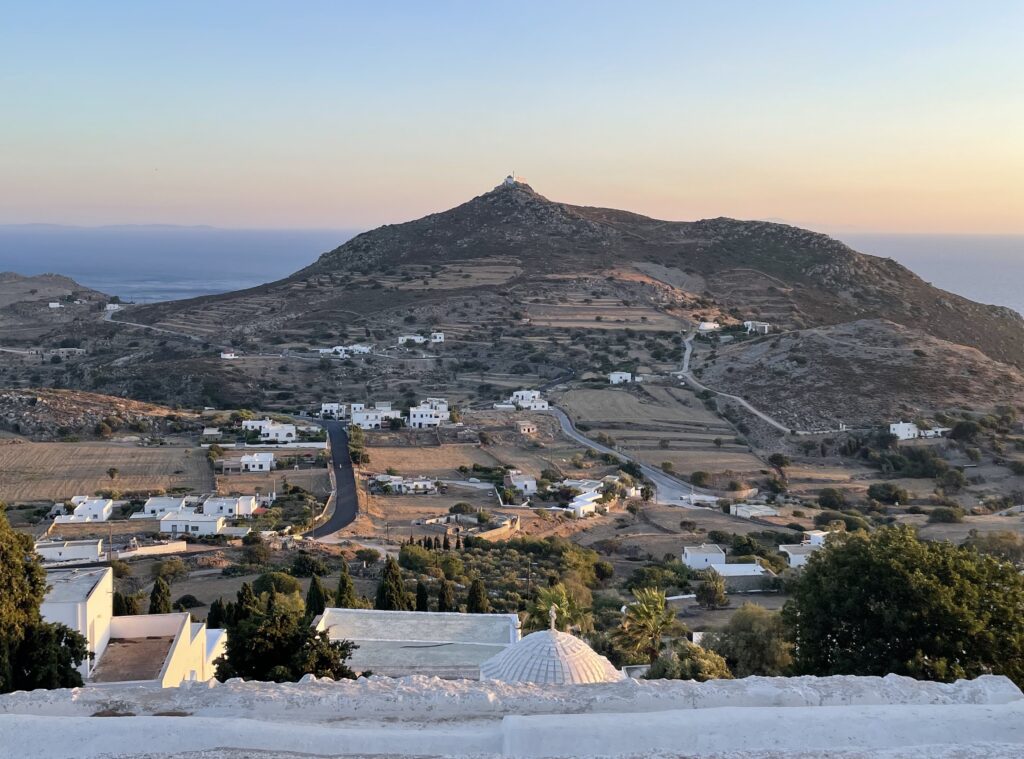
July 29, 2023

Patmos, Greece
Source: MCT
PATMOS—A funny thing happened on my way to this beautiful place, an island without druggies, nightclub creeps, clip joints, or hookers. I stopped in Athens for about five hours in order to look over old haunts and just walk around places I’d known as a youth, when I noticed something incredible: None of the youngsters I encountered were texting, nor were they glued to their mobiles and bumping into people. Sure, some were on their telephones, but the majority were talking and gesticulating like normal humans used to do before the technology curse rained down on us.
Well, as they say, nothing lasts forever, and once in Patmos friends informed me that what I had noticed in Athens was Alice in Wonderland stuff. Still, Patmos is wonderful, with very polite and friendly natives and no left-wing virtue signaling, as the place is full of ovens and gas hobs. The only thing missing is crime. Just Stop Oil cretins would be as welcome here as an atheist in a foxhole, but I’d love to see them come, as the solitary jail in Skala is empty and the cops are feeling underemployed. If you’re looking for action, however, head 85 miles to the southwest and you’ll find the biggest brothel this side of Las Vegas: It’s called Mykonos, and I used to love the place almost as much as I adored my mother. No longer. Even the magical embroidery of memory—the aching pathos of youthful romances and all-night partying—cannot erase the present horror of the place: Rich Arab Gulf playboys, whose inability to attract women is known even in the cheapest dives of Ibiza, bring their own hookers aboard their horror boats, while on terra firma preening naked drag queens kiss and pet in front of children. There are nonstop vomit-inducing displays of wealth by unknown “billionaires,” and worst of all, once-proud Mykonians take in the freak show and do nothing about it. Money does talk.
And yet, why do I choose virtuous Patmos rather than the vice-ridden Mykonos? I am a sinner after all, and proud of it. That’s an easy one. Age has turned me into a goodie-goodie, plus the presence of a wife, two children, and four grandchildren helps in keeping me northeast of temptation. Vice versus virtue is old stuff, and a certain Aristotle dealt with the conundrum around 350 BC. He was Plato’s student until the latter’s death, and then gained further fame by developing a student from the north of Greece, one called Alexander the Great.
Leave it to an American, of course, to turn Aristotle’s Nicomachean Ethics into a self-help work, a review of it recently published in The New York Bagel. The translation and abridgment of Aristotle’s work is by Susan Meyer, and its title is just what hamburger-munching, TV-commercial-watching Americans need: “How to Flourish: An Ancient Guide to Living Well.”
According to the great Greek philosopher Taki, a flourishing existence is also a virtuous one, although Taki points out time and again that “Do as I say, not as I do,” is the basis of his truth. Ethical guidance is desperately needed in the Western world nowadays, but what Aristotle taught was what it means to be good, not how to be good; that’s the modern huckster version. Although Aristotle’s was the first treatise to distinguish between right and wrong, later philosophers like John Stuart Mill and Kant based their philosophies on the same principle.
Promulgating rules for living is now big business, especially in the land of the depraved. The Bagel Times, most of the media, and Hollywood all promote a degenerate style of living, so when someone like Jordan Peterson comes along and advises us on how to live, he is certainly welcome. The great Greek philosopher Taki is often asked about diversity, equity, and inclusion. His answer is, “It’s a great con perpetrated by those who want a bigger slice of the cake but are unwilling to work for it.” Another question posed while the great philosopher T preaches underneath the Acropolis is which words people should never use because they might offend others. His answer is always the same: “Sticks and stones may break my bones, but names will never hurt me.” The vast crowd always gives him a great ovation after that one, and then it’s time for Patmos with a brief stop in Mykonos for a little bit of sinning.
But I digress. My daughter’s great friend and mine, Alexander Schwarzenberg, whose family’s palaces and parks ring Vienna, owns many houses in Patmos and the nearby islands. His mother is Greek, and he speaks the lingo like a native, although he looks like a tall blond prince paratrooper. I am politically to his right, but not by much. He gave a wonderful dinner where I met Greek friends I hadn’t seen in more than thirty years, with the expected result: a massive hangover that would have made the Karamazov brothers keel over. I also met a shipowner whose wife I knew as a little girl, and who was telling a story about how he got into shipping—he owns 42 big ones now—and he mentioned the name of a ship—Metsovon—while trying to remember the name of the other that came with it. “Meteora,” I told him, and he seemed nonplussed. “How do you know this?” “Easy, I’m the one that sold them to you.” More drinks.